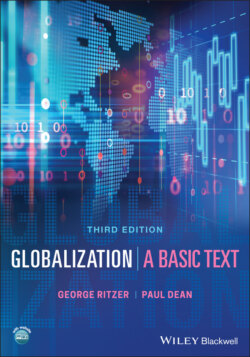Читать книгу Globalization - George Ritzer - Страница 70
COLONIALISM
ОглавлениеColonialism is clearly related to imperialism, and is sometimes used interchangeably with it,3 but it has a more specific meaning (Steinmetz 2016). At the most extreme, imperialism involves a control without the creation of colonies (Harvey 2006). Colonialism generally involves settlers as well as much more formal mechanisms of control than imperialism (Ashcroft 2012a). Thus, colonialism often entails the colonizer creating an administrative apparatus to run its internal affairs, including its settlements, within the colonized country (or geographic area). Edward Said well describes the key differences between imperialism and colonialism, as well as their relationship to one another: “imperialism means the practice, the theory, and the attitudes of a dominating metropolitan centre ruling a distant territory; ‘colonialism’, which is almost always a consequence of imperialism, is the implanting of settlements on distant territory” (cited in Ashcroft et al. 1998: 45). While both imperialism and colonialism involve economic and political (as well as cultural) control, imperialism is (following Lenin) more defined by economic control (and exploitation), while colonialism is more about political control.
Although colonialism has an ancient history, it can be said to have had two great and more recent ages. These occurred during and after the Renaissance (fourteenth through seventeenth centuries) and are associated mainly with European societies. The first, beginning in the fifteenth century, was led by European powers, especially Spain and Portugal, and involved creating colonies in Africa, Asia, and the Americas. The second, or modern, phase lasted roughly between 1820 and the end of WW I. It involved other European powers (most importantly Great Britain, France, and Germany), as well as the US and Japan. For an example of this, see Figure 3.1 of colonial powers and their colonies.
Figure 3.1 Colonial empires and their colonies: 1920. Source: Data from World 1920 empires colonies territory. Retrieved from: https://commons.wikimedia.org/wiki/File:World_1920_empires_colonies_territory.png.
Some colonies (e.g. India as a colony of the British) persisted well into the twentieth century. However, during that period the momentum shifted in the direction of decolonization, or “the process of revealing and dismantling colonialist power in all its forms. This includes dismantling the hidden aspects of those institutional and cultural forces that had maintained the colonialist power and that remain even after political independence is achieved” (Ashcroft et al. 1998: 63). Decolonization movements began to succeed with greater frequency as the twentieth century unfolded. They were followed by decolonization and the achievement of political independence (Grimal 1978). Decolonization was particularly important after the close of WW II. That was followed by a period of neo-colonialism (Nkrumah 1965), where efforts at control over the former colonies, and other nation-states, grew much more indirect, subtle (e.g. through cultural and educational institutions), and focused on economic control and exploitation. Like the new imperialism noted above, the subtlety of neo-colonialism made it more insidious and harder to detect and therefore more difficult to resist and combat. Furthermore, neo-colonialism has been very uneven with African countries having been impacted to a greater degree than other regions (Young 2017).
